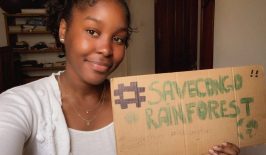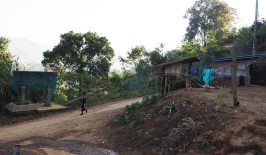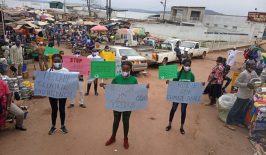Land, water and air pollution, floods, deforestation and droughts. Where Jennifer Villarroel comes from in Argentina, these are all issues that she has witnessed first hand ever since she was a child. And they’re a big reason why now she’s calling upon the government – and the global community – to wake up and take action to protect our planet. We talk to her to find out more.
Not only are people in the Global South often among the most vulnerable to rising global temperatures, but they are also climate activists, educators and changemakers – fighting for a better world, innovating and inspiring others to tackle the issues that we as a planet face. In this series of interviews with environmental activists from Latin America, Africa and Asia, we want to do our bit to decolonise the conversation around climate change and lift up the underrepresented voices within the climate movement. Find all of the interviews in this Voices of Climate Justice series right here.
Argentina is on fire, quite literally, right now, with raging wildfires in forests and grasslands spreading throughout northern and central parts of the country, fuelled by some of the driest conditions in the last ten years. While the cause of the most-recent fires is a source of contention, there’s no debating that Argentina has a huge issue with deforestation. According to a report issued by the Ministry of Environment and Sustainable Development, between 1998 and 2018 Argentina lost an area of native forest 320 times the size of its capital. Of the 16 million acres lost, 87% was located in the the Chaco forest, which cuts across parts of Paraguay, Argentina, Bolivia and Brazil, and is Latin America’s second most important forest, only behind the Amazon in terms of biodiversity and size.
In this interview we talk to Jennifer Villarroel, a climate activist from the city of Salta, in northwestern Argentina, one of the provinces that make up this area of the country. While grassroots initiatives to protect the country’s environment have been successful in the past, environmental researchers suggest that the current government has a lack of interest in enforcing environmental protection laws and provides insufficient funds to finance conservation policies. And deforestation is only one of a whole host of environmental and climate issues that the country is facing. Jennifer talks to us about her belief that citizens have a right and a duty to demand a healthy environment from their governments, her hope that we will learn from the aftermath of Covid-19, media censorship and the powerful role of digital tools in Argentina in giving a platform to people whose voices too often go unheard.
Jennifer, how did you first learn about climate change?
I have been aware of climate change since I was a child, as my province was directly affected; land, water and air pollution, floods, deforestation, droughts and polluting industries. As a child I thought that I could not do anything about all these problems, that the world would continue like this and nothing could change it… But today, as a young woman, I understand that as a citizen I can take small steps, and that I have the duty and the right to demand from a healthy environment from my government. Young people are not the future, we are the present, and we will fight for the future of the new generations.
What about the student strikes? What was your motivation for getting involved with Fridays for Future?
I have been involved with Fridays For Future since it arrived in my province in June 2019. My motivation comes from experiencing the consequences of climate change myself. When I discovered Fridays For Future and its mission to fight for the future of coming generations, I didn’t hesitate to join the movement, and I felt completely comfortable with their mission statement and the way they work. I consider all the activists of Fridays For Future in Argentina as great friends and they are my motivation today.
How has coronavirus affected your protests in Argentina?
Covid-19 has had a huge impact on our demonstrations, our country established a state of emergency that establishes preventive and compulsory social isolation. Because of this, we were not allowed to travel around the city. Faced with this, Fridays For Future Salta decided to join the Digital Strike. At first it was difficult because this situation is discouraging, but today we are more active, the situation taught us to manage various digital tools that we hadn’t used before. That allowed us to be more together than ever and continue with our strikes. You can follow the Fridays for Future YouTube channel and find lots of interesting webinars that were recorded during the pandemic.
What has been the role of digital media or social media in your own development as an activist?
I don’t really have a good opinion about the media. The times I’ve been invited for interviews I didn’t have good experiences. Unfortunately they gave me space to speak in order to try to downplay my struggle or just because “it’s trendy”. I haven’t yet come across media that has a genuine interest in climate change and my climate strikes. Digital media is much more welcoming and open. I can even be my own interviewer and talk about all of the issues that I care about. In my city at least, the huge majority of people use social networks to make their voices heard because getting interviewed on a tv programme or getting a story in the newspaper is very difficult.
Is there anything positive that you hope will emerge from this current crisis?
I think that from this pandemic we must learn to stop consuming animals, really a lot of serious diseases are caused by consuming them. This pandemic also showed us how weak some countries are in terms of development – for example in my city there are terrible deficiencies in the health sector. I know because my grandmother works there. We only have 8 medical respirators and the employees have to use self-made masks because the government is not providing enough of them. It also affected the social sector too much, the worldwide campaign says “wash your hands” but our indigenous communities do not have access to drinking water, they say “stay at home” but poverty levels in Salta City are at 7.7% of the population. Those people cannot simply stay at home, they need to work to feed their families or maybe they do not even have a home. I just hope that we can learn from our failures to grow as a society. Anyone could say “Great! Pollution is down” but that would be ecofascism, it would be a good thing if we could learn to take care of our planet without having so many deaths attached to it.
The protests seem to be getting a lot of attention – but that’s not translating into much action on the part of decision-makers. Why do you think that is?
From my experience, I learned that the vast majority of government officials are colleagues of those who own the polluting companies. I think that no action is taken because of a strong conflict of interest. This is also why we are fighting, so that the government listens to us and understands that the climate crisis will take its toll on our future, and that we will not let that happen.
What are the key messages behind your particular protest? What does your poster say when you hold it up? And who do you want to see it?
When we are demonstrating we always take our “Fridays For Future” flag. I don’t only have one poster, I make one depending on whatever injustices are currently most prevalent in my local area. I have posters against deforestation, urban pollution, water, air pollution, to demand the rights of indigenous peoples, against large-scale mining and many more. Unfortunately where I live there is a huge range of different environmental issues. We demonstrate in front of the Legislative Palace of the City of Salta, where some of the government officials work. We want them to see us so that they become aware and start working on environmental public policies.
What do you hope the Global Strike for Climate can achieve?
I mostly hope that the Global Climate Strike will make the government take action to slow down or reduce the effects of global warming, I also hope that it will generate social awareness about the environment, we as citizens have the responsibility to choose a more sustainable lifestyle. I know it is a difficult path, for some countries it will be more difficult than others, but science is showing us that if we do not act, there will be no future.
Is there anything else you’d like our readers to know?
I would like everyone to wake up and love the planet, every action counts. Just sorting your waste at home is a big step forward! We have to motivate ourselves to imagine a world where future generations will be free to enjoy nature. Pachamama is crying out for help. We can hear her but we’re doing nothing! Read, get informed and have empathy! We don’t have much time to save our future.
You can follow Fridays for Future Argentina on Twitter and Instagram to keep up to date with their protests. For more information about the northwestern region of Argentina where Jennifer lives, you can follow Fridays for Future Salta on Instagram too.
Co-authored by Marisa Pettit and Jan Wisniewski





